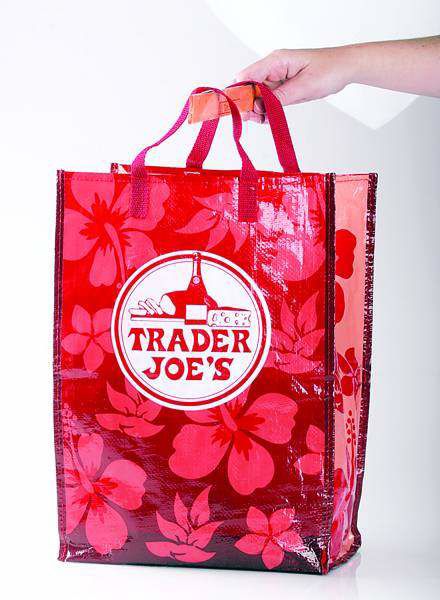This little bag went to market
Published 5:00 am Wednesday, June 4, 2008

- VarietyTrader Joes handed out these bags during its grand opening in March. The bags also are for sale at the store for 99 cents. Trader Joes also sells reusable canvas bags for $2.99, posh city bags (temporarily out of stock) for $1.99, freezer bags for $1.99 and six-pack wine bags for 99 cents.
For Bend resident Jeanette Chamberlain, it was the consumer guilt that got her.
You just feel so guilty with all those (grocery) bags, she said last week outside Newport Avenue Market on Bends west side.
Chamberlain was carrying her own reusable shopping bag that day, a heavy cotton tote she bought at a California market a decade ago.
She does it to save the forests, she says, and is buying more reusable bags to give as party favors at an upcoming family reunion.
I just use it and use it, she said, her bag bulging with items, and I have lots of others, one from here, one from Trader Joes , and the list goes on.
Reusable shopping bags are everywhere these days, following the wave of eco-trendiness flooding all aspects of consumerism. Some cities have imposed restrictions on retailers using plastic bags, although none in Central Oregon does, and some retailers, like Ikea, are phasing the bags out all together.
Chamberlains bag was one of the originals that have been around for years neutral colors and thick materials making an all-purpose tote or canvas bag. Shopping bags have evolved, however, adding a stylish flair to make them more marketable. Now, retailers big and small are turning out their own branded reusable bags and offering cash incentives for shoppers to go green.
At Bends Century Drive Safeway last week, Stephanie Russell juggled her two young daughters and four reusable shopping bags as she walked from her car to the store. Her bags were from Fred Meyer, where Russell said she got them for free during a recent promotion.
Its better for the environment, she said, bending down to help her 4-year-old and 2-year-old get in the shopping cart. Its easier and they hold more stuff.
While most stores sell or give away their own reusable shopping totes, a quick Internet search reveals hundreds of other options for consumers who want to buy a unique bag. Shoppers can choose from all shapes, sizes and materials, including organic cotton and woven baskets.
Some of the new models fold neatly into a little packet for easy storage in a pocket or purse negating the problem of forgetting the bags at home or in the car.
While the more expensive bags can cost $15 each, others run around $5 to $7 per bag online, plus shipping costs.
Most grocery store bags, many made out of recycled materials, cost around $1.
A small price to pay, environmental advocates say.
If you dont bring a reusable shopping bag and shop once per week and leave with four grocery bags … that is over 200 bags that youre eventually, if not immediately, filling the landfill with each year, said Nikki Roemmer, program director for The Green Spot, a directory of sustainable living from the Central Oregon Environmental Center in Bend.
Of course, since the stores (plastic) bag is not as durable as a reusable shopping bag and the handles dont hold up as well, you better double-bag it, she said, which adds up to over 400 bags a year … you get the idea.
Paper or plastic?
If you think paper is more environmentally friendly than plastic, experts say youre wrong.
Both forms of shopping bags are harmful to the environment when thrown away, according to a report from nonprofit organization the Environmental Literacy Council. However, both may be re-used in the home, notably the more-durable paper bags.
Both plastics and paper are made using fossil fuels, and their transport to stores also requires fuel and creates harmful emissions.
Only 80 percent of U.S. waste ends up in landfills, according to the council. Plastic bags threaten marine life because when ingested, they can block the stomach or cause starvation among sea animals. Sea turtles, for example, often mistake plastic bags for jellyfish. Plastic bags also clog sewer pipes, leading to standing water and its associated health hazards.
Plastic bags, however, take up less space than paper in landfills 9 percent to 12 percent of waste volume versus paper products, which occupy roughly half of landfill volume.
Plastics do not biodegrade, but in most modern landfills, neither do paper bags, according to the council. Because the waste is isolated from air and water, nothing much can break down.
When it comes to the paper-versus-plastic debate, reSource Executive Director Mike Riley said consumers should be over it.
People should think about other stuff when theyre shopping, Riley said. Like the kind of packaging they are buying, how processed is the food they are buying, what stuff is organic and how far this food has traveled to get here.
ReSource helps businesses, consumers and youth make choices that reduce their impact on the environment, Riley said.
Shopping locally, organically and without a heavy meat base is the best thing for the environment, Riley said.
A bag idea
Roemmer defines reusable bags as any that shoppers bring to a store with them instead of taking new bags each visit. That means consumers can use any bagging receptacle old bags work, too.
In the past few years, environmental issues are getting more public attention. With that increased consciousness, more people are personally trying to make an impact on preserving the Earths resources, Roemmer said.
Utilizing a reusable shopping bag is probably one of the easiest things that anyone can do to make a daily, personal impact, she said, and it proves to be very effective in reducing waste and energy.
Of course, not all reusable shopping bags are created equal.
It is always beneficial to buy locally, Roemmer said. So get your bag from a local business, reducing the fuel used to package and transport your lone reusable shopping bag (this applies to online shopping, too).
New designs of reusable bags make them more user-friendly, Roemmer said: They tend to be more comfortable to carry than plastic or paper bags, they hold more groceries and are more sturdy, with no need to worry that the handles will break or the bottom will fall out.
Because the bags are easier to carry, Roemmer said they encourage consumers to get outside and walk to the grocery store.
Walking instead of driving will reduce your carbon footprint and preserve the quality of the air we breathe, she said.
Money bags
Retailers have been quick to use environmental issues to promote their stores. Now, many are enticing shoppers with financial incentives.
A quick look around town shows that most stores offer refunds or rewards for reusable bags. Safeway offers a
3-cent discount per reusable bag, Albertsons, Newport Avenue Market and Rays Food Place discount 5 cents per bag and Natures General Store discounts 10 cents if a shoppers bag saves the store from using its handled bags. Trader Joes allows customers with reusable bags to add their names for a prize drawing.
Cutting down on plastic and paper bags is in the retailers best interest, said Spike Bement, store manager at Newport Avenue Market in Bend.
He said his stores white paper bags cost 15 cents each, whereas his biodegradable plastic bags cost 5 to 6 cents each. Owner Rudy Dory said the average plastic grocery bags cost retailers around 2 cents apiece.
Newport Market is currently having a promotion in which customers who spend at least $50 receive a free reusable shopping bag. Newport Market will discount those bags a nickel apiece and also donate a portion of the sales proceeds to Bend Metro Park and Recreation District.
Many retailers already collect shoppers old plastic or paper grocery bags for recycling. Target is trying to educate its shoppers on how they can reuse their plastic shopping bags. The white plastic is printed with different use options: holding kittie litter, lining the waste basket, being a laundry bag or storing wet clothing after a trip to the pool or beach.
Two years ago, Newport Market introduced a plastic bag made from organic materials, so it biodegrades in landfills.
Shopping at local businesses that support the local economy and community is a plus because some businesses, like Newport Market, donate money to nonprofit organizations for every bag customers bring in, Roemmer said.
It is businesses like these who have helped to bring awareness to consumers about reusable shopping bags, Roemmer said. It is a way of life that inspires and educates people of all ages for a healthy future.








